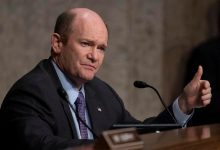Why Ripple (XRP) Case Could Define Gary Gensler’s Career

The US Securities Exchange Commission (SEC) chairman, Gary Gensler, has attracted political opposition for his approach to crypto. Judges in the Ripple and Coinbase lawsuits have rebuked the agency for its lack of consistency in applying laws.
In the Ripple case, the court found the SEC guilty of “hypocrisy” by arguing its case without remaining faithful to the law. The agency also failed to respond in “good faith” to a request for clarity about crypto rules submitted by US exchange Coinbase.
Gensler Could Lose SEC War on Crypto
Moreover, a recent op-ed describes Gensler’s drive to rein in crypto and other industries as ideological rather than practical. Congressman Ritchie Torres, a vocal Gensler critic, said the former Goldman Sachs partner “is a politician masquerading as a regulator.”
Gensler’s crypto crackdowns have even faced resistance from his own political party. The US Supreme Court has also grown hostile against agencies that regulate industries at their discretion.
Coinbase cited the so-called major questions doctrine in its defense against SEC charges it ran an unregistered brokerage. Coinbase argued that Congress will not allow agencies to expand their jurisdiction on important economic or political matters.
Ripple Labs successfully contested SEC accusations that its sales of XRP to retail buyers were unregistered securities. If the court rules that the sales to institutional investors were unregistered securities, then Ripple could bring out documents where a former SEC official said that Bitcoin (BTC) and Ethereum were not securities.
Read more: Everything You Need To Know About Ripple vs. SEC
If it loses the Coinbase and Ripple cases, the SEC could be barred from exercising rights that Congress didn’t grant. Gensler has three years left in his role, but the courts could dent his crypto ambitions before then.
Lawyers Tear Into SEC Inconsistencies
The court called the SEC’s rejection of Grayscale’s application to convert its Bitcoin trust into an exchange-traded fund “arbitrary and capricious.” In a Twitter thread last Friday, Ripple lawyer Stuart Alderoty said the court asked the SEC why it should not be disciplined for making “false and misleading representations” in another case, SEC vs. Debt.

John Deaton SEC Tweet. Source: John Deaton
Pro-crypto lawyer John Deaton said he decided to buy XRP after the SEC sued Ripple because he believed the judge would uphold the law. Deaton also recently offered his interpretation of an investment contract to highlight the SEC’s inconsistent applications of securities laws.





 Bitcoin
Bitcoin  Ethereum
Ethereum  Tether
Tether  Dogecoin
Dogecoin  USDC
USDC  Cardano
Cardano  TRON
TRON  Chainlink
Chainlink  Stellar
Stellar  Hedera
Hedera  Bitcoin Cash
Bitcoin Cash  LEO Token
LEO Token  Litecoin
Litecoin  Cronos
Cronos  Ethereum Classic
Ethereum Classic  Monero
Monero  Dai
Dai  Algorand
Algorand  OKB
OKB  Cosmos Hub
Cosmos Hub  Stacks
Stacks  Theta Network
Theta Network  Gate
Gate  Maker
Maker  KuCoin
KuCoin  Tezos
Tezos  IOTA
IOTA  NEO
NEO  Zcash
Zcash  Polygon
Polygon  Synthetix Network
Synthetix Network  Tether Gold
Tether Gold  TrueUSD
TrueUSD  Dash
Dash  Holo
Holo  Zilliqa
Zilliqa  Enjin Coin
Enjin Coin  0x Protocol
0x Protocol  Qtum
Qtum  Basic Attention
Basic Attention  Siacoin
Siacoin  Ravencoin
Ravencoin  Bitcoin Gold
Bitcoin Gold  Decred
Decred  NEM
NEM  DigiByte
DigiByte  Ontology
Ontology  Nano
Nano  Status
Status  Hive
Hive  Waves
Waves  Huobi
Huobi  Lisk
Lisk  Numeraire
Numeraire  Steem
Steem  Pax Dollar
Pax Dollar  BUSD
BUSD  OMG Network
OMG Network  Ren
Ren  Bitcoin Diamond
Bitcoin Diamond  Bytom
Bytom